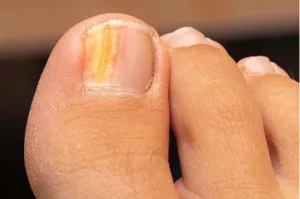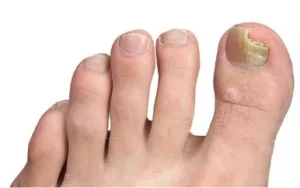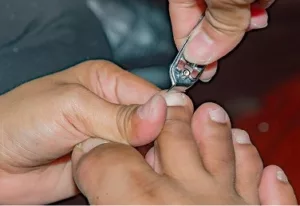A toenail fungus infection, called onychomycosis, is a common nail problem. It makes your nails thick, discolored, or oddly shaped. It often starts as a white or yellow-brown spot under the nail. It usually happens in toenails and can affect about 14 out of every 100 people.

If you have a toenail fungus infection, you might notice your nails changing. They could become discolored, thicker, and crumbly. Your nails might also feel weak and painful. Sometimes, they might even separate from your skin.
Exposure to environments where fungi thrive, such as gym showers, can result in fungal nail infections. They can also happen if you injure your nail, giving fungi a way in. Certain medical conditions, like psoriasis or diabetes, can make you more likely to get them. These infections can be painful and cause long-lasting damage. If your immune system is weak, the infection can get worse.
How is a Toenail Fungus Infection Diagnosed?
Our providers at Medical Offices of Manhattan use different methods to diagnose fungal nail infections. They might look at your nails closely or take samples to check in a lab. This could involve looking at the nail clippings under a microscope or doing molecular tests to see if there are fungi. Sometimes, they need to do special tests to see which treatment will work best. Treatments can include taking antifungal pills or using medicated nail polish. It’s important to get the right diagnosis before starting treatment to make sure it works well.
Toenail fungus infection can be treated in different ways. Your doctor might give you medication to take by mouth, which you’ll need to take every day for a few months. They’ll also keep an eye on you with blood tests to make sure the pills aren’t causing any problems. Or, they might give you special nail polish or cream to put directly on the infected nail. Sometimes, they might even suggest laser treatment, which involves using laser beams to treat the infection, but it’s not a guaranteed cure. Your doctor will come up with a plan just for you based on how bad your symptoms are, which might include a mix of pills and creams. They’ll keep checking on you to see how you’re doing and adjust your treatment if needed.
To avoid fungal nail infections:
- Keep feet clean and dry, soak nails before trimming, and avoid tearing nails.
- Choose breathable shoes that fit well.
- Trim nails straight across and clean nail tools regularly.
- Avoid barefoot walking in public areas, use flip flops, and change socks regularly.
- Consider using over-the-counter antifungal creams preventively.
If you leave a fungal nail infection untreated, there are several risks and complications:
- Spreading Infection: The infection can spread to the skin between your toes or other parts of your body, affecting more nails if not treated quickly.
- Pain and Discomfort: Untreated nail fungus can be painful and make it hard to walk or wear shoes comfortably.
- Nail Changes: Infected nails might become thicker, discolored, or crumbly, leading to permanent damage like thick, brittle nails that look strange.
- Recurring Infections: Even if you treat it once, nail fungus often comes back, so you might need ongoing treatment.
- Secondary Infections: Not treating the fungal infection can lead to other infections caused by bacteria.
- Cosmetic Concerns: In severe cases, your nails might look bad, which can make you feel less confident about your appearance.
- Complications for Certain Groups: People with circulation problems or weak immune systems can have serious complications like cellulitis. Diabetics are also at higher risk.
It’s really important to see a doctor as soon as possible to prevent these risks and keep yourself healthy.





